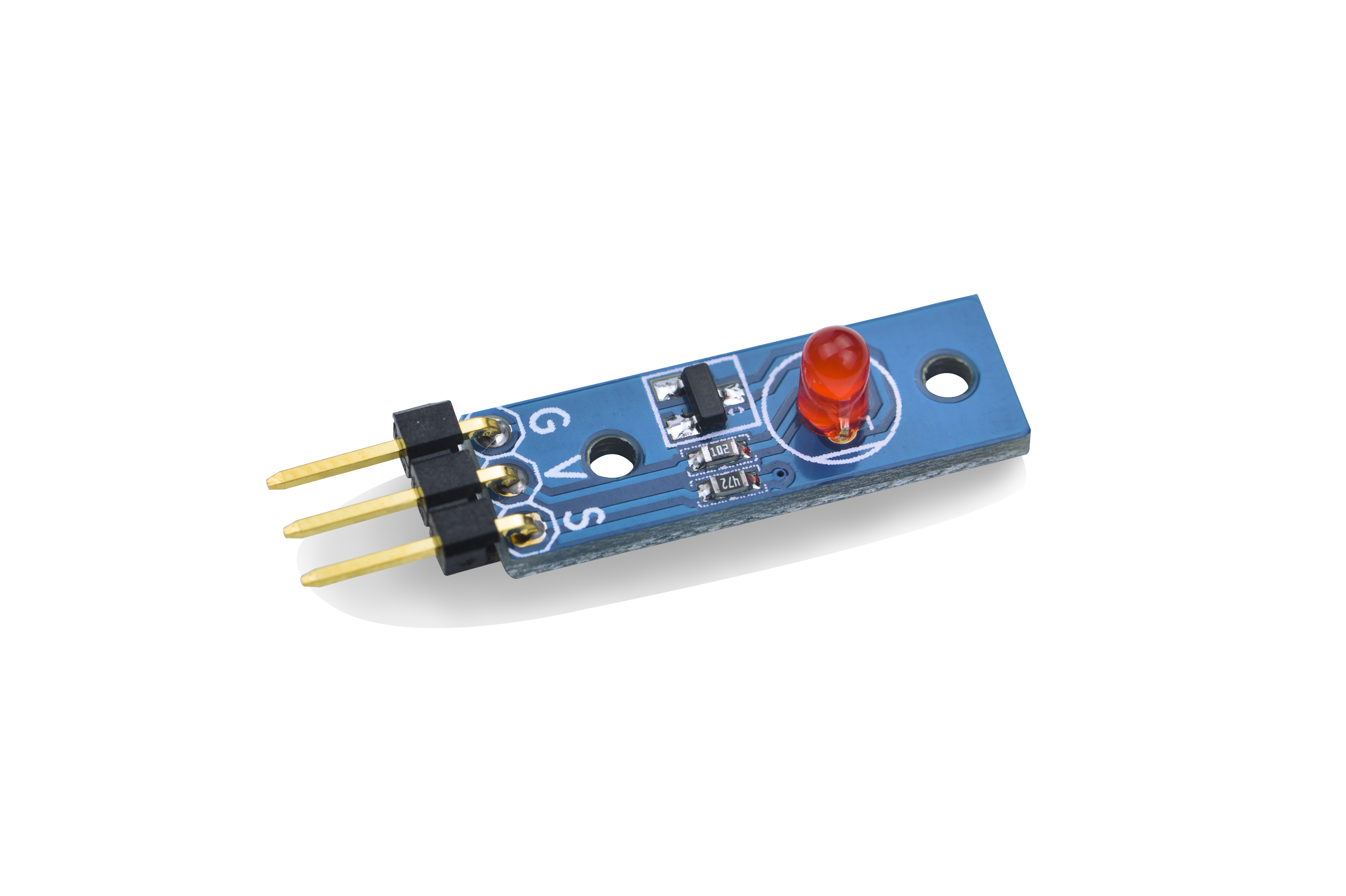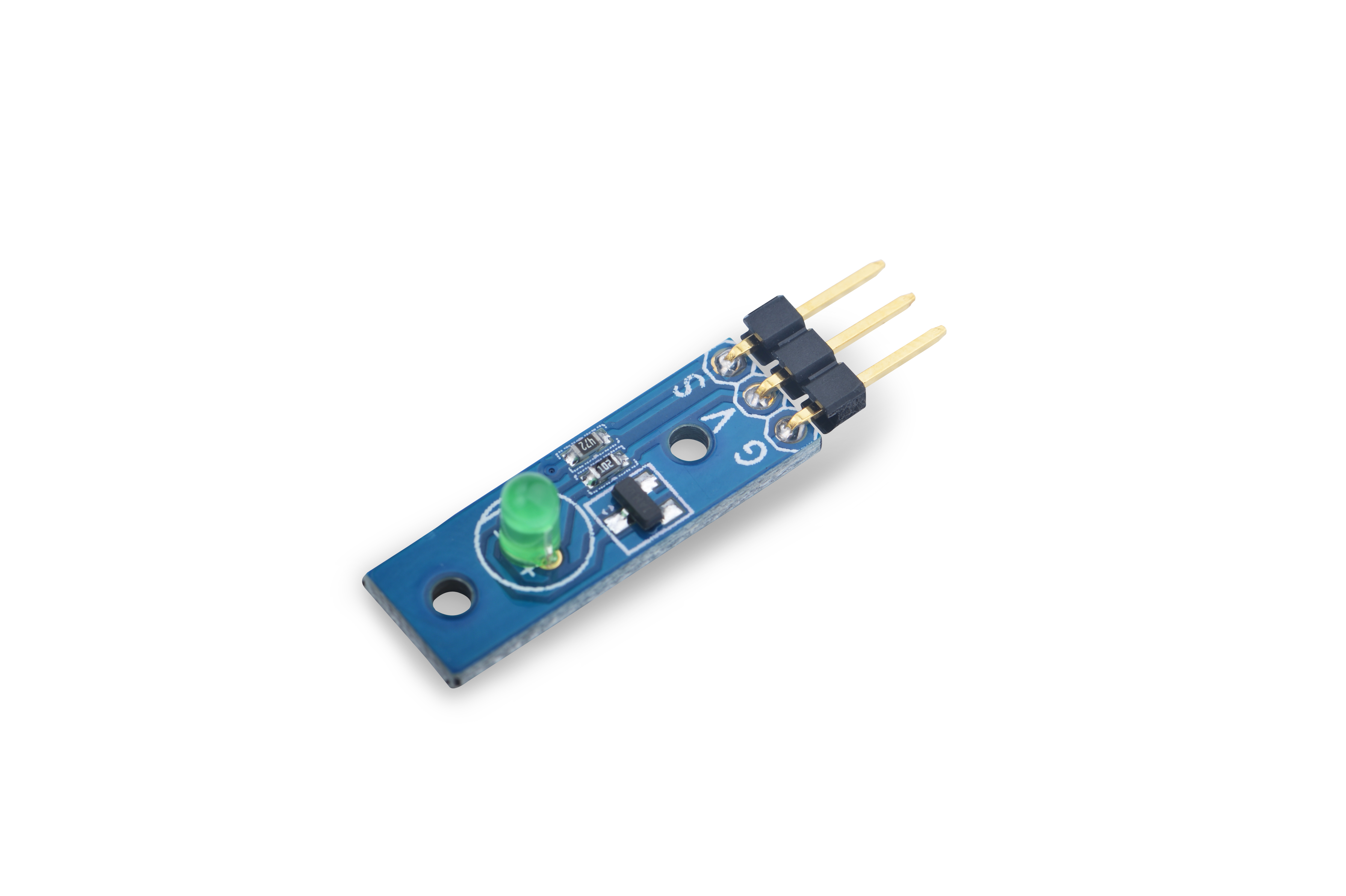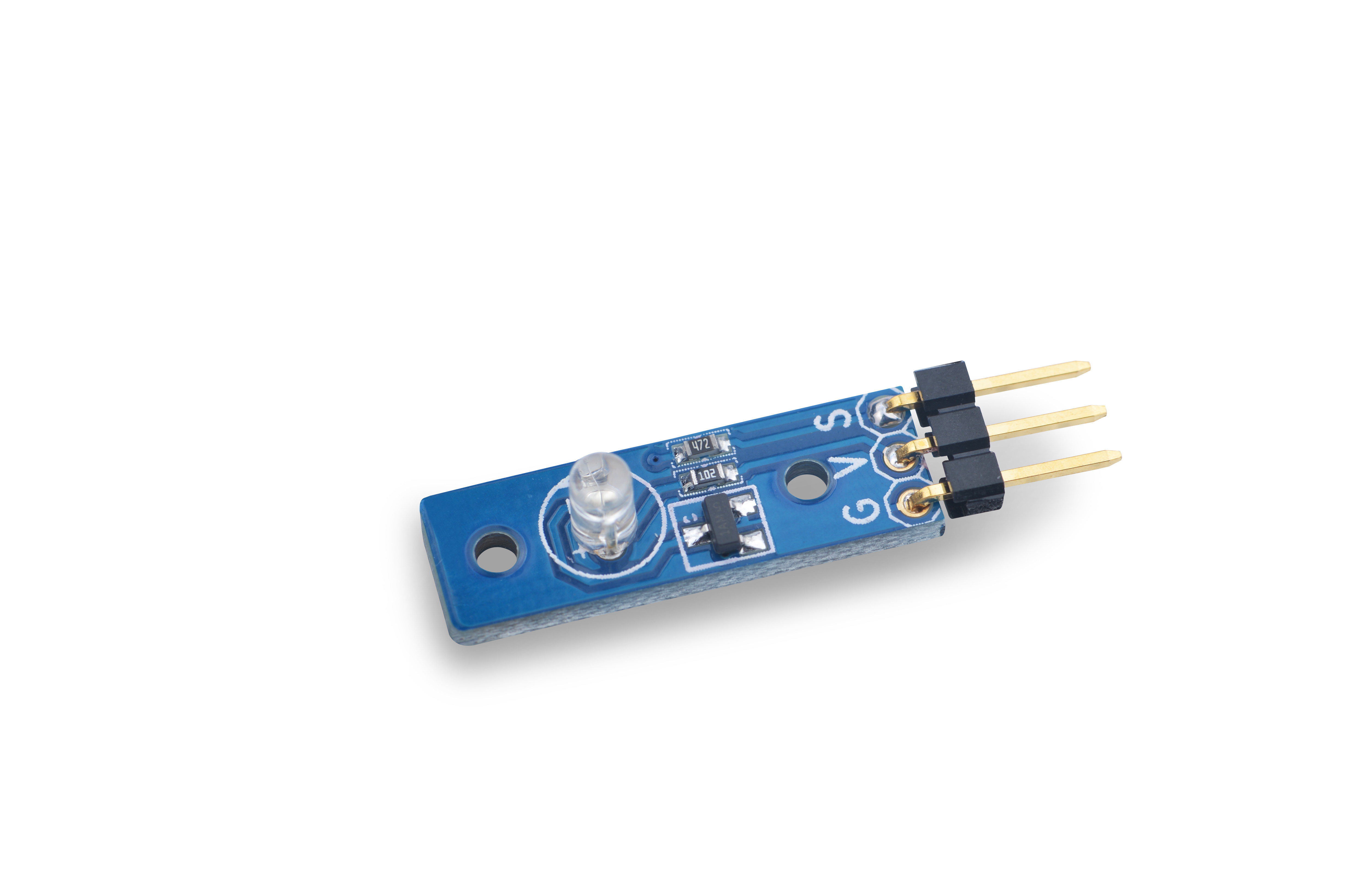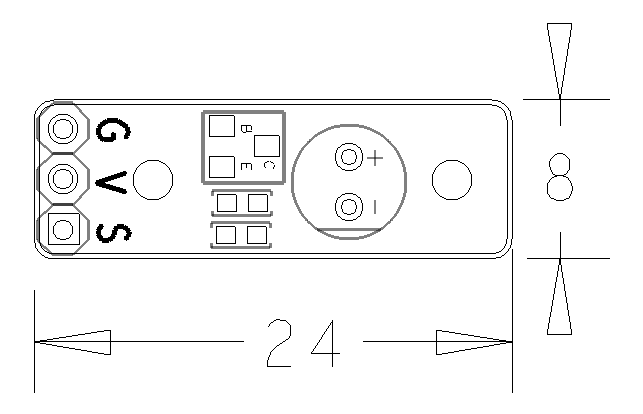Difference between revisions of "Matrix - LED"
(→Update Log) |
(→Update Log) |
||
| (4 intermediate revisions by the same user not shown) | |||
| Line 29: | Line 29: | ||
The module has three 2.54 mm spacing pins: V(supply voltage),G(ground) and S(signal) which is connected to a triode to turn the LED on or off. You can write high or low, or PWN signals(3.3V or 5V) to S. When you write high to S the LED will turn on and become brightest. When you write low to S the LED will turn off. If you write PWM signals to S the LED's brightness will vary depending on the PWM's signal variances. | The module has three 2.54 mm spacing pins: V(supply voltage),G(ground) and S(signal) which is connected to a triode to turn the LED on or off. You can write high or low, or PWN signals(3.3V or 5V) to S. When you write high to S the LED will turn on and become brightest. When you write low to S the LED will turn off. If you write PWM signals to S the LED's brightness will vary depending on the PWM's signal variances. | ||
| + | ==Applications== | ||
| + | ===Connect to NanoPi M1=== | ||
| + | Refer to the following connection diagram to connect the module to the NanoPi M1:<br> | ||
| + | [[File:Matrix-LED_nanopi_m1.jpg|frameless|600px|Matrix-LED_nanopi_m1]] | ||
| + | |||
| + | Connection Details: | ||
| + | {| class="wikitable" | ||
| + | |- | ||
| + | |Matrix-LED || NanoPi M1 | ||
| + | |- | ||
| + | |S || Pin7 | ||
| + | |- | ||
| + | |V || Pin4 | ||
| + | |- | ||
| + | |G || Pin6 | ||
| + | |} | ||
| + | |||
| + | ===Connect to NanoPi 2=== | ||
| + | Refer to the following connection diagram to connect the module to the NanoPi 2:<br> | ||
| + | [[File:Matrix-LED_nanopi_2.jpg|frameless|600px|Matrix-LED_nanopi_2]] | ||
| + | |||
| + | Connection Details: | ||
| + | {| class="wikitable" | ||
| + | |- | ||
| + | |Matrix-LED || NanoPi 2 | ||
| + | |- | ||
| + | |S || Pin7 | ||
| + | |- | ||
| + | |V || Pin4 | ||
| + | |- | ||
| + | |G || Pin6 | ||
| + | |} | ||
| + | |||
| + | ===Connect to NanoPi M2 / NanoPi 2 Fire=== | ||
| + | Refer to the following connection diagram to connect the module to the NanoPi M2/ NanoPi 2 Fire:<br> | ||
| + | [[File:Matrix-LED_nanopi_m2.jpg|frameless|600px|Matrix-LED_nanopi_m2]] | ||
| + | |||
| + | Connection Details: | ||
| + | {| class="wikitable" | ||
| + | |- | ||
| + | |Matrix-LED || NanoPi M2 | ||
| + | |- | ||
| + | |S || Pin7 | ||
| + | |- | ||
| + | |V || Pin4 | ||
| + | |- | ||
| + | |G || Pin6 | ||
| + | |} | ||
| + | |||
| + | ===Connect to NanoPC-T2=== | ||
| + | Refer to the following connection diagram to connect the module to the NanoPC-T2:<br> | ||
| + | [[File:Matrix-LED_NanoPC-T2.jpg|frameless|600px|Matrix-LED_NanoPC-T2]] | ||
| + | |||
| + | Connection Details: | ||
| + | {| class="wikitable" | ||
| + | |- | ||
| + | |Matrix-LED || NanoPC-T2 | ||
| + | |- | ||
| + | |S || Pin15 | ||
| + | |- | ||
| + | |V || Pin29 | ||
| + | |- | ||
| + | |G || Pin30 | ||
| + | |} | ||
| + | |||
| + | ==Compile & Run Test Program== | ||
| + | Boot your ARM board with Debian and copy the matrix code: | ||
| + | <syntaxhighlight lang="bash"> | ||
| + | $ apt-get update && apt-get install git | ||
| + | $ git clone https://github.com/friendlyarm/matrix.git | ||
| + | </syntaxhighlight> | ||
| + | If your cloning is done successfully a "matrix" directory will be generated. | ||
| + | |||
| + | Compile and install Matrix: | ||
| + | <syntaxhighlight lang="bash"> | ||
| + | $ cd matrix | ||
| + | $ make && make install | ||
| + | </syntaxhighlight> | ||
| + | |||
| + | Run test program: | ||
| + | <syntaxhighlight lang="bash"> | ||
| + | $ matrix-gpio_out | ||
| + | </syntaxhighlight> | ||
| + | Note: this module is not plug and play therefore before running the module please make sure it is connected to an ARM board.<br> | ||
| + | Here is what you should observe:<br> | ||
| + | <syntaxhighlight lang="bash"> | ||
| + | 1: gpio status change | ||
| + | 2: gpio status change | ||
| + | 3: gpio status change | ||
| + | 4: gpio status change | ||
| + | 5: gpio status change | ||
| + | </syntaxhighlight> | ||
| + | The LED will be blinking continuously. | ||
| + | |||
| + | ==Code Sample== | ||
| + | This Matrix code sample can work with all the ARM boards mentioned in this module's wiki. The name of this code sample is "matrix-gpio_out". Here is its source code: | ||
| + | <syntaxhighlight lang="c"> | ||
| + | int main(int argc, char ** argv) | ||
| + | { | ||
| + | int pin = GPIO_PIN(7); | ||
| + | int i, value, board; | ||
| + | int ret = -1; | ||
| + | |||
| + | if ((board = boardInit()) < 0) { | ||
| + | printf("Fail to init board\n"); | ||
| + | return -1; | ||
| + | } | ||
| + | if (board == BOARD_NANOPI_T2) | ||
| + | pin = GPIO_PIN(15); | ||
| + | |||
| + | if (argc == 2) | ||
| + | pin = GPIO_PIN(atoi(argv[1])); | ||
| + | if ((ret = exportGPIOPin(pin)) == -1) { | ||
| + | printf("exportGPIOPin(%d) failed\n", pin); | ||
| + | } | ||
| + | if ((ret = setGPIODirection(pin, GPIO_OUT)) == -1) { | ||
| + | printf("setGPIODirection(%d) failed\n", pin); | ||
| + | } | ||
| + | for (i = 0; i < STATUS_CHANGE_TIMES; i++) { | ||
| + | if (i % 2) { | ||
| + | value = GPIO_HIGH; | ||
| + | } else { | ||
| + | value = GPIO_LOW; | ||
| + | } | ||
| + | if ((ret = setGPIOValue(pin, value)) > 0) { | ||
| + | printf("%d: GPIO_PIN(%d) value is %d\n", i+1, pin, value); | ||
| + | } else { | ||
| + | printf("setGPIOValue(%d) failed\n", pin); | ||
| + | } | ||
| + | sleep(1); | ||
| + | } | ||
| + | unexportGPIOPin(pin); | ||
| + | return 0; | ||
| + | } | ||
| + | </syntaxhighlight> | ||
| + | For more details about this APIs called in this code sample refer to [[Matrix API reference manual]] <br> | ||
| + | <!--- | ||
==Download Matrix Source Code== | ==Download Matrix Source Code== | ||
All the matrix modules' code samples are open source. They are maintained on GitHub - https://github.com/friendlyarm/matrix.git <br> | All the matrix modules' code samples are open source. They are maintained on GitHub - https://github.com/friendlyarm/matrix.git <br> | ||
| Line 305: | Line 442: | ||
==Connect to Arduino== | ==Connect to Arduino== | ||
| + | ---> | ||
==Resources== | ==Resources== | ||
==Update Log== | ==Update Log== | ||
| − | ===Feb- | + | ===Feb-18-2016=== |
| − | * | + | * Added the description for "NanoPi 2 branch" in Section 4 |
| − | * Added | + | * Added Section 5: Connect to NanoPi 2 |
| + | ===June-21-2016=== | ||
| + | * Re-organized and simplified wiki | ||
<!-- | <!-- | ||
Latest revision as of 14:36, 21 June 2016
Contents
1 Introduction
The Matrix-LED is an LED module with three 2.54 mm spacing pins: V(supply voltage),G(ground) and S(signal) which is connected to a triode to turn the LED on or off. You can write high or low, or PWN signals(3.3V or 5V) to S. When you write high to S the LED will turn on and become brightest. When you write low to S the LED will turn off. If you write PWM signals to S the LED's brightness will vary depending on the PWM's signal variances.
2 Features
- GPIO/PWM interface, 3.3/5V, PWM brightness control
- Small, easy to be used in various situations
- 2.54 mm spacing pin
- PCB Dimension(mm): 8 x 24
- Pin Description:
| Pin | Description |
| S | GPIO |
| V | Supply Voltage 5V |
| G | Ground |
3 Basic Device Operation
The module has three 2.54 mm spacing pins: V(supply voltage),G(ground) and S(signal) which is connected to a triode to turn the LED on or off. You can write high or low, or PWN signals(3.3V or 5V) to S. When you write high to S the LED will turn on and become brightest. When you write low to S the LED will turn off. If you write PWM signals to S the LED's brightness will vary depending on the PWM's signal variances.
4 Applications
4.1 Connect to NanoPi M1
Refer to the following connection diagram to connect the module to the NanoPi M1:
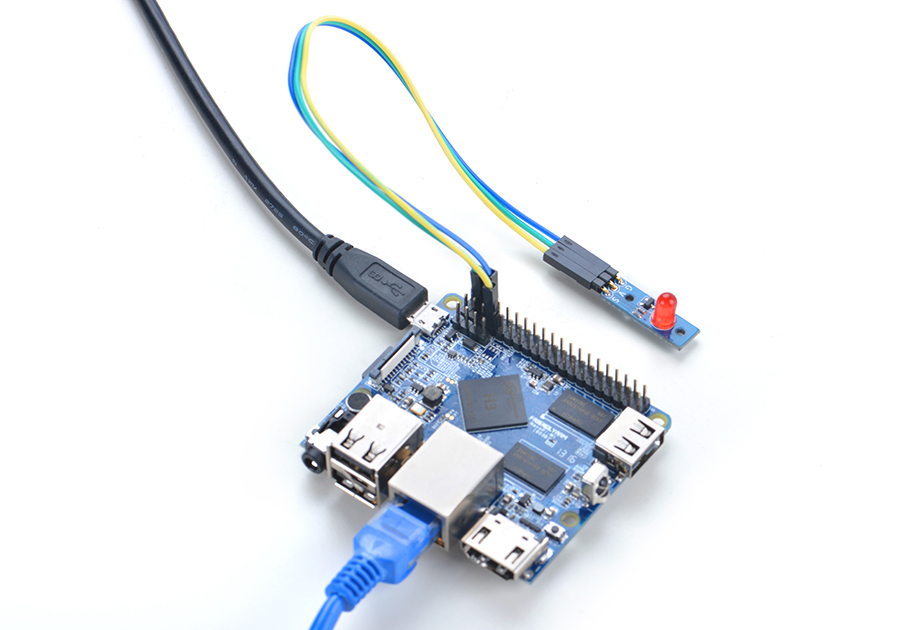
Connection Details:
| Matrix-LED | NanoPi M1 |
| S | Pin7 |
| V | Pin4 |
| G | Pin6 |
4.2 Connect to NanoPi 2
Refer to the following connection diagram to connect the module to the NanoPi 2:
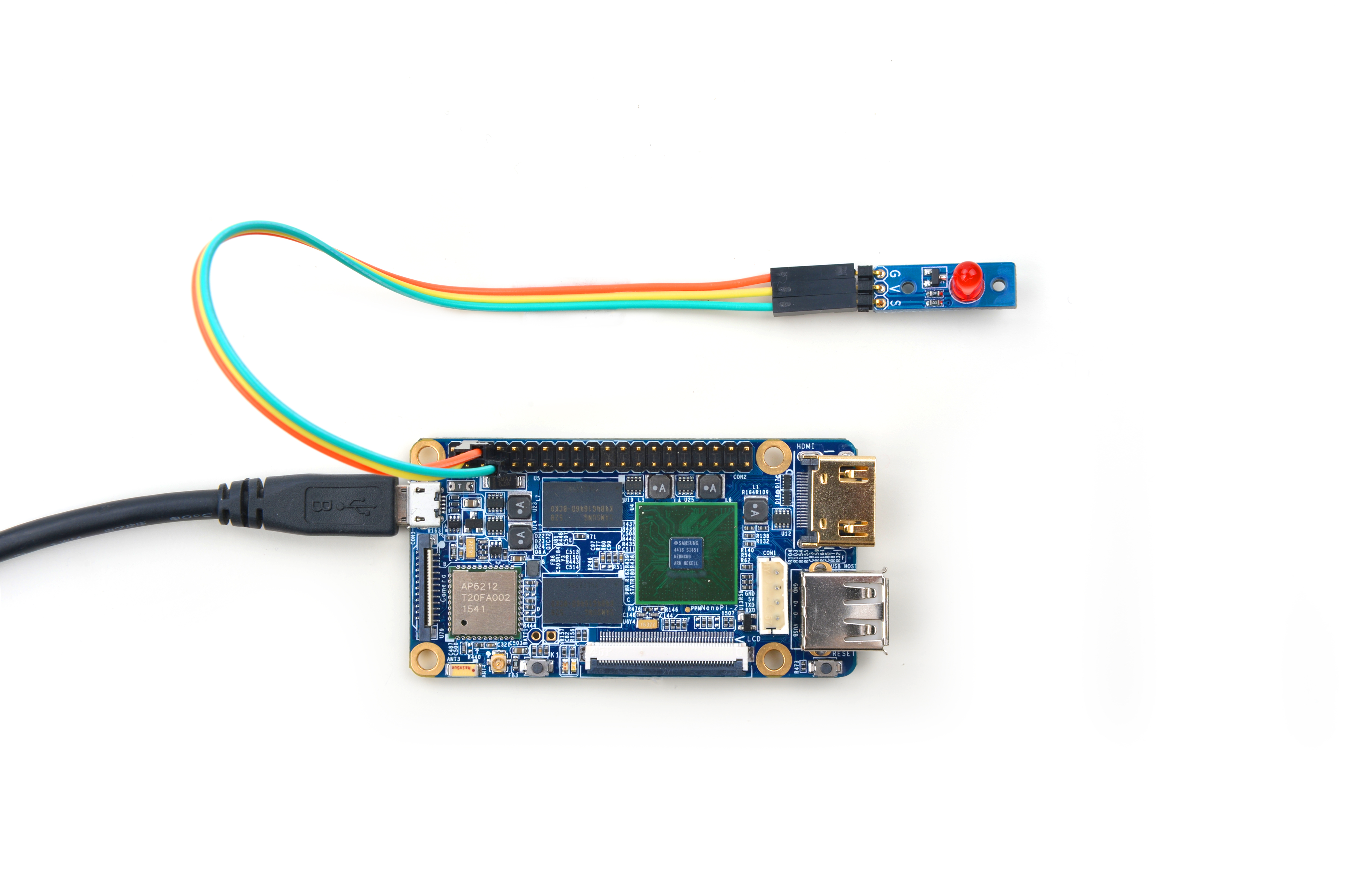
Connection Details:
| Matrix-LED | NanoPi 2 |
| S | Pin7 |
| V | Pin4 |
| G | Pin6 |
4.3 Connect to NanoPi M2 / NanoPi 2 Fire
Refer to the following connection diagram to connect the module to the NanoPi M2/ NanoPi 2 Fire:
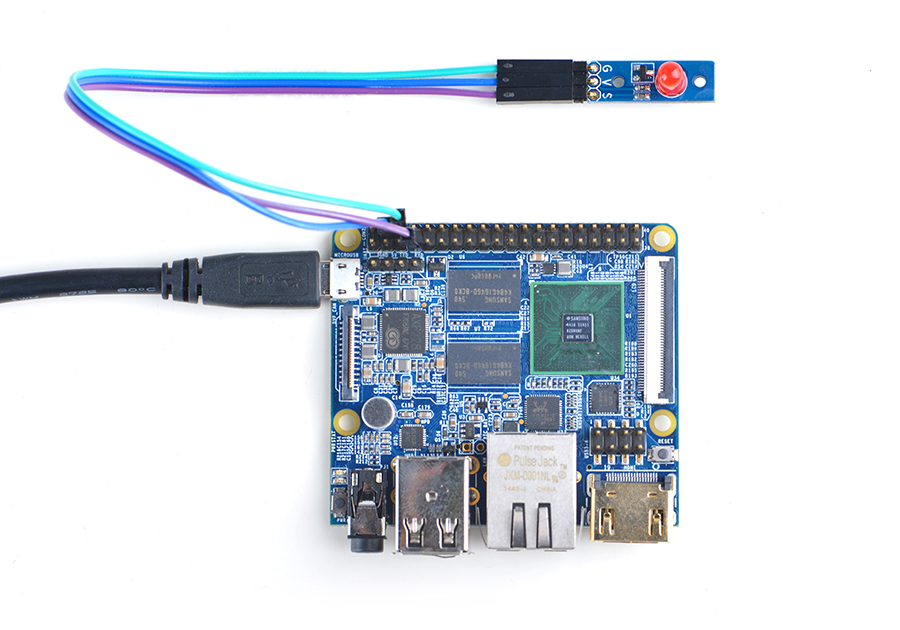
Connection Details:
| Matrix-LED | NanoPi M2 |
| S | Pin7 |
| V | Pin4 |
| G | Pin6 |
4.4 Connect to NanoPC-T2
Refer to the following connection diagram to connect the module to the NanoPC-T2:
Matrix-LED_NanoPC-T2
Connection Details:
| Matrix-LED | NanoPC-T2 |
| S | Pin15 |
| V | Pin29 |
| G | Pin30 |
5 Compile & Run Test Program
Boot your ARM board with Debian and copy the matrix code:
$ apt-get update && apt-get install git $ git clone https://github.com/friendlyarm/matrix.git
If your cloning is done successfully a "matrix" directory will be generated.
Compile and install Matrix:
$ cd matrix $ make && make install
Run test program:
$ matrix-gpio_outNote: this module is not plug and play therefore before running the module please make sure it is connected to an ARM board.
Here is what you should observe:
1: gpio status change 2: gpio status change 3: gpio status change 4: gpio status change 5: gpio status change
The LED will be blinking continuously.
6 Code Sample
This Matrix code sample can work with all the ARM boards mentioned in this module's wiki. The name of this code sample is "matrix-gpio_out". Here is its source code:
int main(int argc, char ** argv) { int pin = GPIO_PIN(7); int i, value, board; int ret = -1; if ((board = boardInit()) < 0) { printf("Fail to init board\n"); return -1; } if (board == BOARD_NANOPI_T2) pin = GPIO_PIN(15); if (argc == 2) pin = GPIO_PIN(atoi(argv[1])); if ((ret = exportGPIOPin(pin)) == -1) { printf("exportGPIOPin(%d) failed\n", pin); } if ((ret = setGPIODirection(pin, GPIO_OUT)) == -1) { printf("setGPIODirection(%d) failed\n", pin); } for (i = 0; i < STATUS_CHANGE_TIMES; i++) { if (i % 2) { value = GPIO_HIGH; } else { value = GPIO_LOW; } if ((ret = setGPIOValue(pin, value)) > 0) { printf("%d: GPIO_PIN(%d) value is %d\n", i+1, pin, value); } else { printf("setGPIOValue(%d) failed\n", pin); } sleep(1); } unexportGPIOPin(pin); return 0; }
For more details about this APIs called in this code sample refer to Matrix API reference manual
7 Resources
8 Update Log
8.1 Feb-18-2016
- Added the description for "NanoPi 2 branch" in Section 4
- Added Section 5: Connect to NanoPi 2
8.2 June-21-2016
- Re-organized and simplified wiki
